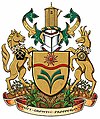Taber, Alberta
| Taber | ||
|---|---|---|
| Town | ||
| Town of Taber | ||

Taber town centre
|
||
|
||
| Motto: "Unity, Growth, Prosperity" | ||
| Location of Taber in Alberta | ||
| Coordinates: 49°47′05″N 112°09′03″W / 49.78472°N 112.15083°WCoordinates: 49°47′05″N 112°09′03″W / 49.78472°N 112.15083°W | ||
| Country |
|
|
| Province |
|
|
| Region | Southern Alberta | |
| Census division | 2 | |
| Municipal district | Municipal District of Taber | |
| Incorporated | ||
| • Village | March 15, 1905 | |
| • Town | July 1, 1907 | |
| Government | ||
| • Mayor | Hendrick De Vlieger | |
| • Governing body |
Taber Town Council
|
|
| • CAO | Cory Armfelt | |
| • MLA | Grant Hunter (WR) | |
| Area (2016) | ||
| • Land | 15.67 km2 (6.05 sq mi) | |
| Elevation | 815 m (2,674 ft) | |
| Population (2016) | ||
| • Total | 8,428 | |
| • Density | 537.9/km2 (1,393/sq mi) | |
| Time zone | MST (UTC-7) | |
| Postal code span | T1G | |
| Highways |
Highway 3 Highway 36 |
|
| Waterway | Oldman River | |
| Website | Official website | |
Taber /ˈteɪbər/ is a town in southern Alberta, Canada within the Municipal District of Taber. It is located approximately 51 km (32 mi) east of the City of Lethbridge at the intersection of Highway 3 and Highway 36.
Taber is famous for its corn due to the large amounts of sunshine the area receives. It is therefore known as the Corn Capital of Canada and holds an annual "Cornfest" in the last week of August.
Originally, Taber was known as "Tank No. 77," and was used by the railway to fill up on water. In 1903, it is said that the first Mormon settlers from the U.S. were the ones to establish a hamlet at the Tank. After the town's post office was built in 1907, the CPR decided to call the town "Tabor," probably after Mount Tabor in the Holy Land. However, various letters and station heads came out printed "Taber," so the CPR changed the name to make it match the records.
An alternate version of the towns name origin is that the first part of the word was used by Mormon settlers in the vicinity, and the next Canadian Pacific Railway station was named Elcan (nacle spelled backwards).
After time, Taber became a successful coal mining town. Coal mining declined in the late 1920s, but picked up in the 1930s after extensive irrigation in the area.
...
Wikipedia


